With the joint efforts of six people, DOGE completed an administrative reorganization of the U.S. government that had not been achieved in decades in just two weeks. Their operations are extremely efficient, with each person responsible for multiple tasks and operating day and night.
Author: Penny, BlockBeats
On the morning of February 3, Washington time, the headquarters building of the United States Agency for International Development (USAID) was closed, and the originally bustling office area fell silent. Just the night before, officials from the Department for Government Efficiency (DOGE) led by Elon Musk formally took over the more than 60-year-old international aid agency and announced plans to shut it down completely. USAID employees received an email stating that except for those in key positions, all employees had switched to telecommuting. At the same time, USAID’s official website was offline, official social media accounts were deleted, and the organization’s operations stalled.
Musk said on social media that he had discussed the matter with President Trump and received full authority to shut down USAID. He claimed that the agency was a “extreme left-wing criminal organization” and must be completely disbanded.
Musk and Trump collaborated to establish the Department of Government Efficiency (DOGE) to promote radical reforms in the name of “streamlining government.” Its core goals are mainly to reduce government spending, digitally transform the bureaucratic system, and replace human decision-making with algorithms. This vigorous shutdown of USAID has also exposed the true colors of this previously mysterious DOGE team member. This may be just the beginning. The power map of the U.S. federal government is rapidly being reshaped.
Composition of the team: An average of 22 years old “six tech players”
The DOGE team consists of six technical elites aged 19-25, all of whom have no government experience but are closely connected to Musk companies (such as SpaceX, Neuralink) or Silicon Valley capital (such as Peter Thiel).
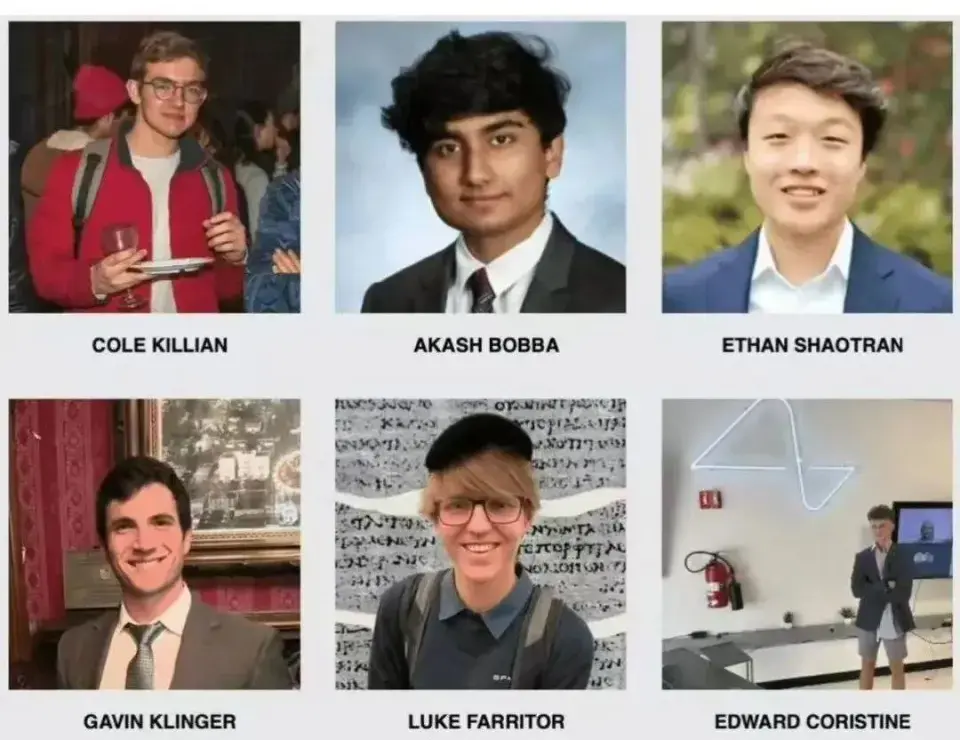
figure source network
Gavin Krieger (25 years old): Krieger graduated from the University of California, Berkeley, majoring in electrical engineering and computer science. He served as a senior software engineer at Databricks, a US AI data analysis company. He is an expert in artificial intelligence and big data analysis. Krieger, whose task was to write executive orders and ensure they took effect quickly within the government, wrote the email sent to all USAID employees that they would not have to return to work at headquarters on Monday. He also directly drafted a funding review order against the U.S. Treasury, participated in OPM’s large-scale layoffs plan, and was responsible for formulating “re-employment standards” for civil servants, so that future government employees must go through DOGE approval before they can be recruited.
Luke Farito (23): Farito dropped out of the University of Nebraska at Lincoln and later worked for Nat Friedman, the Silicon Valley entrepreneur behind GitHub. He interned at SpaceX, writing software for pumps, valves and other components that help fuel rockets. Farritor is currently listed as an “executive engineer” in the Office of the Secretary of Health and Human Services (HHS), personally overseeing USAID’s digital lockdown operation, and has targeted the systems of the Centers for Medicare and Medicaid Services, which are responsible for contracts.
Edward Kristin (19): Kristin is the youngest. He has just graduated from high school and studied mechanical engineering and physics at Northeastern University in Boston. He worked for Musk’s brain-computer interface company Neuralink last summer. For three months, his specific responsibilities are not yet clear. Kristin used the non-governmental Google Gmail to join calls with U.S. General Services Administration employees, asking them to check the code he wrote and justify his work, a move that sparked dissatisfaction among federal employees.
Akash Boba (21 years old): Boba is from the University of California, Berkeley. He was an investment engineering intern at Bridgewater Fund. He also worked at Meta and Palantir, an American software service company founded by MAGA funder Peter Thiel. Interned, specializing in artificial intelligence, data analysis and financial modeling. He is responsible for designing algorithms to monitor the flow of government funds, and the “Fiscal Expenditure Real-Time Monitoring System” he leads allows real-time freezing of federal “inefficient spending” without congressional review.
Ethan Soutland (22 years old): Soutland is a senior majoring in computer science at Harvard University. He is the only person on the team with experience in artificial intelligence entrepreneurship. The artificial intelligence company he founded, Energize AI, received a US$100,000 grant from OpenAI and was runner-up in the hackathon held by Musk’s artificial intelligence company xAI. Soutland is responsible for DOGE’s AI government program, with the goal of replacing the government’s traditional human decision-making mechanism with algorithms, automating most administrative approvals, budget evaluations, and even congressional reports.
Gautier Cole Killian (24 years old): Hack the Ministry of Finance’s security system and gain access to the payment network. Killian graduated from McGill University with strong abilities in financial data processing and worked as an engineer at Jump Trading, a company specializing in high-frequency financial transactions and algorithms. Killian’s main task is to help the DOGE team crack the Treasury’s security defenses, allowing them to access the government payment network and directly read millions of transaction records without security checks. Killian is also one of the few young people who have received senior access to the White House, and Musk has a high trust in him.
With the joint efforts of these six people, DOGE completed an administrative reorganization of the U.S. government that had not been achieved in decades in just two weeks. Their operations are extremely efficient, with each person responsible for multiple tasks and operating day and night. Some employees of the team do not leave their posts 7 x 24 hours a day, sleep in the office when they are tired and sleepy, and conduct a comprehensive audit of bottomless U.S. federal agencies. Musk speaks highly of them, once praising them on social media as “the future of the new government.”
The White House launches a “Silicon Valley Blitz”
Since Trump took office on January 20, the Department of Government Efficiency (DOGE) led by Musk has begun vigorous reforms:
On January 20, the Chief Diversity Officers Executive Committee (CDOEC) was closed;
On February 3, the U.S. Agency for International Development (USAID) was closed;
The Ministry of Education may be abolished (the DOGE team has begun reviewing the Ministry of Education’s contract and financial data and plans to eliminate “non-essential expenditures”, implying that the Ministry of Education may become the next target for abolition);
The Department of Labor and the Department of Health and Human Services are potential targets (the DOGE team has begun collecting their financial data and may take further action in the future).
The New York Times disclosed that at Trump’s behest, Musk’s team is using extraordinary means to implement a systematic takeover of U.S. federal agencies. The most controversial USAID shutdown is only the prelude to this profound change-in fact, it was long before the agency closed. In the past half month, more than 70% of USAID’s departments have been abolished one after another. More than a thousand regular employees and contract personnel have been forcibly dismissed or suspended indefinitely. Its digital portal has been completely paralyzed, social media has stopped being updated, and even the nameplates of the agency’s headquarters have been quietly removed.
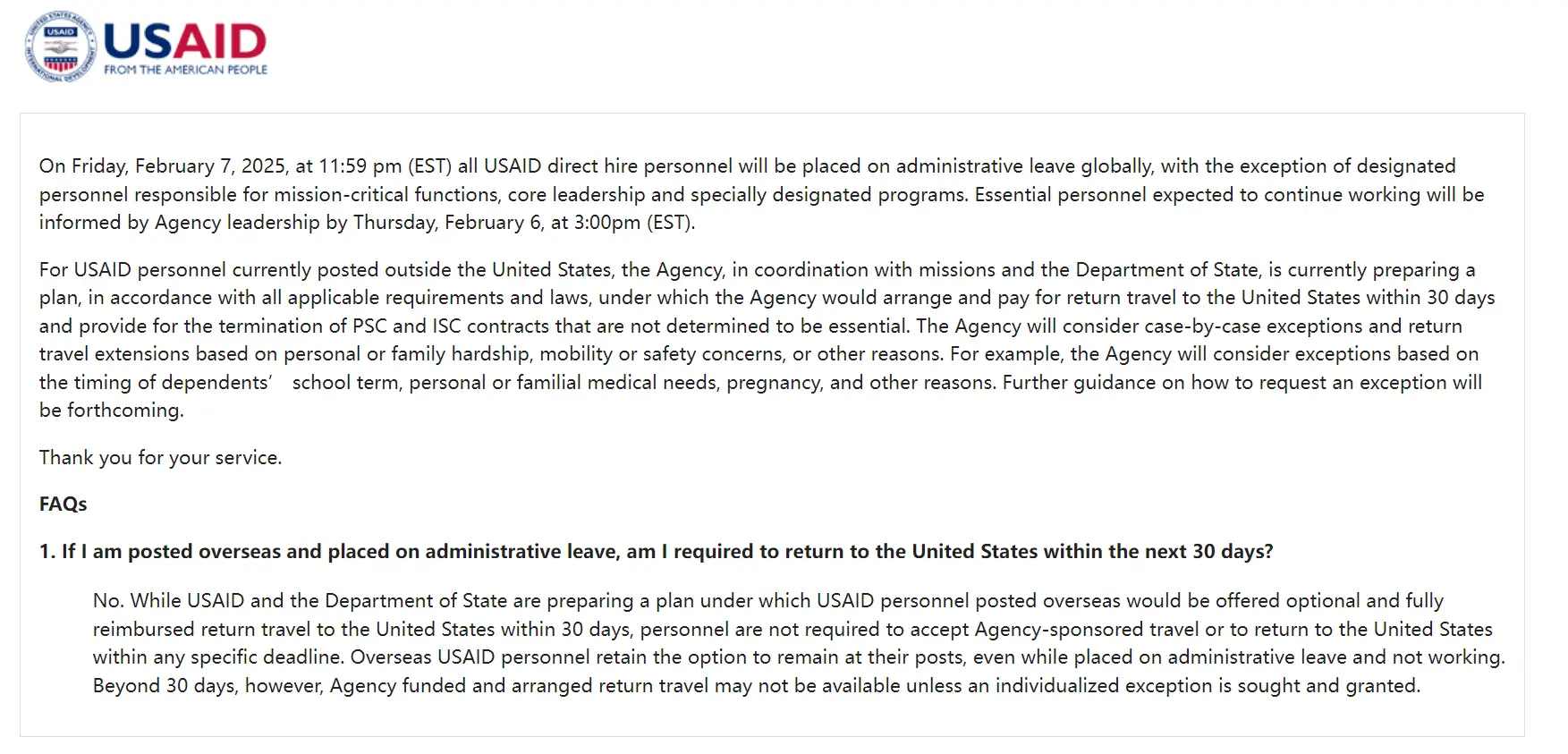
Tuyuan USAID official website states that all direct employees of USAID will take administrative leave at 11:59 pm on Friday, February 7
This systemic takeover is spreading at an alarming rate. Musk’s DOGE team not only quickly took control of the USAID operating center, but also simultaneously penetrated into core departments such as the Ministry of Finance, the Office of Personnel Management (OPM), and the General Services Administration (GSA). Chief security officers and chief financial officers of several key departments have been removed from office, and a large number of senior civil servants have been dismissed from office. In sharp contrast, hundreds of new technology pioneers who lack government work experience but have mysterious connections to Musk are entering important government positions through special channels. They can directly access confidential databases without going through routine security reviews.
Particularly controversial is DOGE’s penetration of fiscal payment centers. This financial lifeline, which governs social security payments, Medicaid, civil servant salaries and corporate subsidies across the United States, has always been operated by career financial officials. However, the DOGE team has recently broken through traditional constraints. Not only has it obtained real-time monitoring authority for the financial payment system, but it has also begun to establish a screening mechanism for non-essential expenditures and is preparing to implement smart cuts on federal welfare programs.
Musk claimed on social media that the federal government has a large amount of “illegal payments” in its daily spending, including foreign aid, social welfare, academic research funds, etc., while DOGE’s goal is to cut spending by $4 billion a day. On February 6, DOGE issued a document stating that 78 contracts in the DEI, non-performing assets, media and consulting categories had been terminated, including a contract for “Groundwater Exploration and Assessment in the Islamic Republic of Mauritania.” The total savings were approximately $110 million.
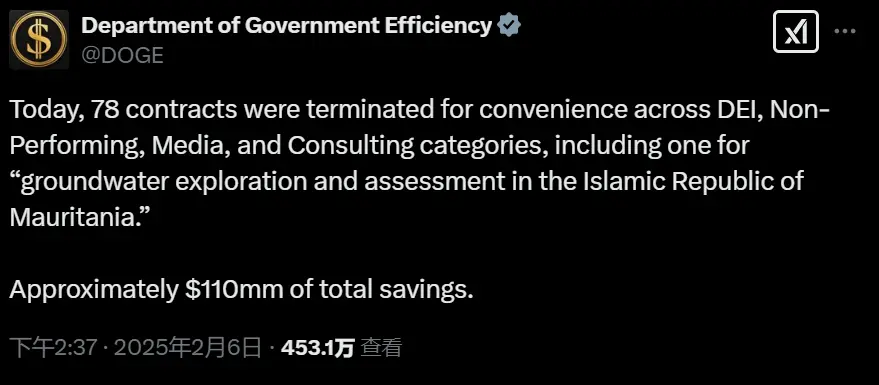
Of course, there are also some ironic changes, especially on gender issues that China generally cannot understand. On February 6, DOGE officials tweeted,”The social protection Administration has terminated the contract of the ‘Gender X Initiative Mark’ and removed all content involving gender ideology from public-oriented applications. This saved more than $1 million and was in line with the president’s executive order “(accompanying picture below).
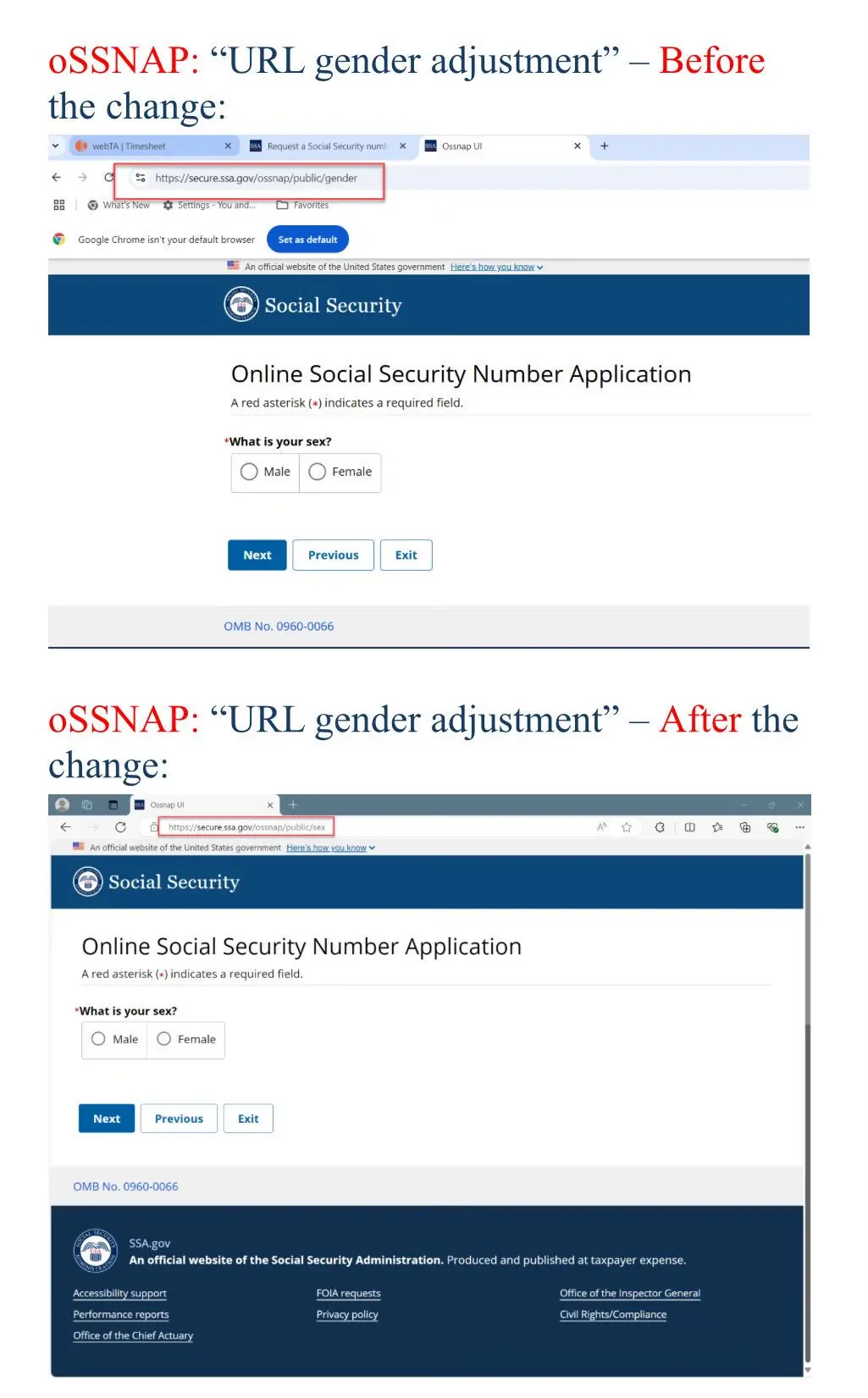
In the picture, the change involves the URL change of the online social protection application page, which is adjusted to “/sex” instead of “/gender.” Although the wording of the application form itself has not changed, it still says,”What is your gender?” It also provides options for “male” and “female”, but the official terminology has shifted from “gender” to “sex” and does not recognize psychological identification with gender. This is consistent with the executive order signed by Trump on January 20, 2025 titled “Defend Women from Gender Ideological Extremism and Restore the Biological Truth of the Federal Government.” The order defines gender as the dualism of men and women, requires federal agencies to use “gender” rather than “gender identity,” stops funding gender-confirmed care, and prohibits transgender people from using facilities based on their gender identity in federally funded single-gender facilities.

Photo source: New York Post, Trump made remarks that he only supported both sexes, men and women
As DOGE gradually penetrated into the core of government agencies, the balance of power tilted more and more. In internal communications, civil servants were told that they must accept “government efficiency reforms” or risk being fired or transferred to marginal positions. Some employees at the Ministry of Finance even received warning emails suggesting that their positions might be cut. At the same time, Musk taunted government workers on social media, calling them “lazy” and encouraging them to resign voluntarily, implying that only those who are “willing to adapt to the new system” can stay in office.
Musk’s plan goes far beyond cutting spending and purging officials. His goal is to create a new model of government-a governance system led by technology entrepreneurs and assisted by algorithms and artificial intelligence for administrative decisions. He has assigned a team of former Tesla, xAI, and SpaceX employees to start developing government management artificial intelligence to automatically review budgets, approve projects, and analyze the effectiveness of policy implementation in the future.
In the next step, DOGE is considering dissolving the U.S. Department of Education through administrative measures. Officials have been discussing an executive order that would remove all functions of the U.S. Department of Education that are not explicitly included in the statute or transfer certain functions to other departments. It is worth mentioning that Trump mentioned in an interview with Musk in August last year that if he was re-elected president of the United States, he would close the U.S. Department of Education.
A power crisis that tears American politics?
As DOGE’s influence swept through politics like a gust of wind, the voices of opponents also rose.
The sudden closure of USAID not only caused waves in the United States, but also caused widespread concern in the international community. The agency manages a huge amount of approximately US$40 billion every year, involving more than 100 countries around the world, covering multiple fields such as humanitarian aid, development support and health projects. Its sudden shutdown has caused many countries and aid organizations to lose aid, and some emergency aid projects are even at risk of interruption.
At the same time, Treasury Secretary Scott Bessent gave Musk and his DOGE team access to payment system data as soon as he took office. The move has sparked widespread controversy, with critics pointing out that it could expose sensitive information of tens of millions of citizens and businesses, endanger the financial security of Americans, and even threaten the stability of national infrastructure and personal privacy.
DOGE took control of the Office of Personnel Management (OPM) and the General Services Management Bureau (GSA) without proper review or authorization. The legality and capabilities of a series of personnel appointments also quickly aroused external doubts and criticism. Generally speaking, the formulation of federal policies requires multiple levels of approval within government agencies, and ultimately the decision is made jointly by cabinet members and the president. However, Musk and his core team bypassed this process and formed an informal decision-making group dominated by tech elites, entrepreneurs and young engineers.
In response, Democratic Senator Chuck Schumer announced that he would work with House Democratic Leader Hakim Jeffries to introduce legislation to resist DOGE’s “illegal interference.” At the same time, multiple lawsuits have been filed against Musk in federal court, charging DOGE officials with unauthorized access to confidential information, violating government procurement regulations, and abusing executive orders to cut federal spending.
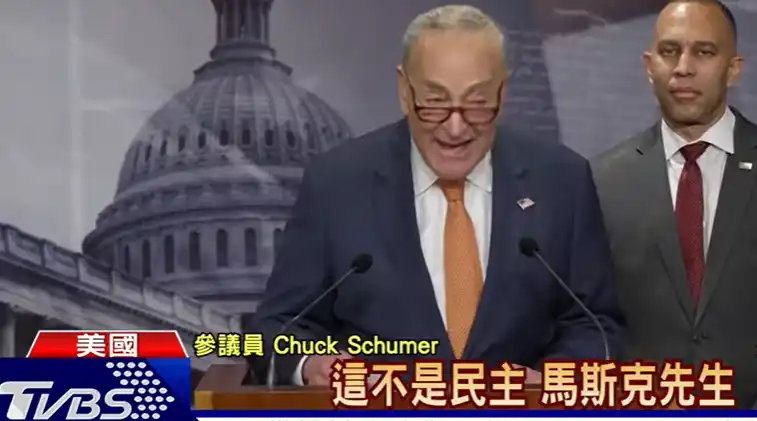
Photo source: TVBS NEWS, Democrats oppose Musk's reform
On February 6, local time, the U.S. Department of Government Efficiency (DOGE) led by Musk suffered a setback when federal judge Colleen Kollar-Kotelly issued a temporary injunction prohibiting the Treasury Department from providing data in its payment system to outsiders. As a result, Musk himself will not be able to review the data retrieved from the payment system.
A double whammy never came. Hours after the judge’s ruling, Marko Elez, a 25-year-old programmer at DOGE, resigned abruptly after it was discovered that he had posted racist comments on his dormant social media account.
Behind Musk’s strong actions are inseparable from President Trump’s strong support and trust. In the White House, Musk not only has an independent office, but also frequently attends meetings with senior officials. Trump has publicly expressed “confidence in Musk’s decision-making many times.” In terms of government operations, Musk tried to abandon the traditional bureaucratic system and adopt an efficient model similar to Silicon Valley companies. Many senior government officials expressed concern that such reforms could lead to excessive concentration of power in the hands of private capital and undermine government transparency and accountability mechanisms. But under Trump’s protection, Musk’s pace of reform remains at a breakneck pace despite some obstacles.

Dramatic reforms are always a war without smoke. They may establish a subversive global government management model or become victims of power struggles. If Democratic opposition grows, or strong opposition emerges in the judicial system, DOGE’s reform may slow down for some reason. However, based on current efficiency, Musk’s actions are much faster than the traditional administrative system that is too big to be removed. A technology-led and efficiency-oriented “enterprise-based” government is being shaped. Is this adventure between Musk and six young people a genius innovation or a dangerous game? This answer can only wait for the verification of time.



